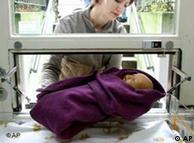 |
| A Johannesburg orphanage says its baby hatch gives desperate mothers an alternative to dumping their babies in rubbish bins |
Throughout Europe, foundling wheels have existed since the 17th and 18th centuries. Today, in many European countries (Germany, Austria, Belgium, the Czech Republic and Hungary to name a few) as well as in Malaysia, Kuala Lumpur, Japan, Brazil, Canada and the US, it is legal for mothers to anonymously abandon their babies via the baby hatch in hospitals and social welfare agencies, though the details vary by country and state. In the US, all 50 states have a type of 'Safe Haven' law that permits mothers who choose not to keep their infants to legally leave them in official care. In South Asia, Pakistan has over 300 baby hatches. In both Pakistan and India, this practice provides an alternative to female infanticide. This killing of infant girls is motivated by the pressure of providing dowries for daughters among the poor as well as the traditional preference for boys (see the Economist's, Missing Girls in India and Bangladesh and India: violence against women ).
In the 17th an 18th centuries, these infants were adopted, fostered out to families as farm labor or conscripted by the state into the military or into work programs. Today, many will find new homes or be cared for as sons as daughters if not in families, by state or social welfare agencies. At the very least baby bins can provide hope to replace the despair heaped upon children brought into the world under circumstances that cannot sustain them.
To read the full article on baby bins in BBC news click here.
 |
| Baby hatch, Germany |
No comments:
Post a Comment